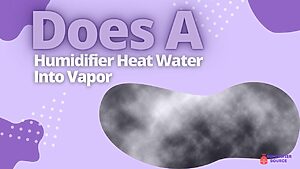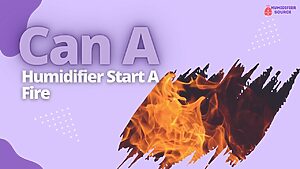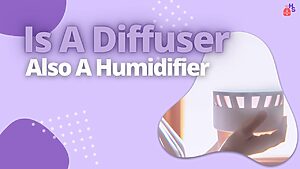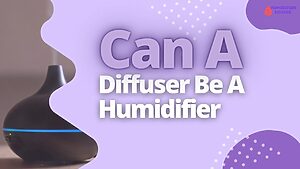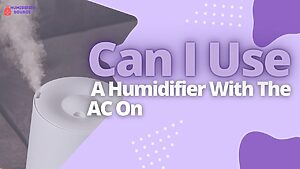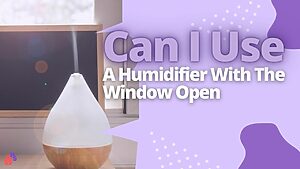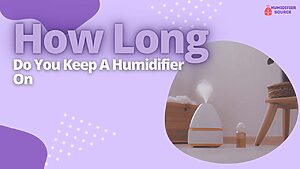Do you have a humidifier in your home? Do you use it in the winter or summer? These devices are very common, but do you know what to do if it is causing problems with your electronics?
Do you ever wonder if the humidifier you’re using is safe to use around your electronics? Or, maybe you’ve wondered if it will cause any problems with your electronics. There are some things that you need to know when using it.
In this post, I’ll go over why humidifiers are essential, and I’ll go over how they can affect your electronics.
Key Takeaway’s
- Humidifiers can negatively affect electronics by causing condensation.
- This can lead to short circuits and other problems.
- It is important to keep humidifiers away from electronics.
- If possible, use a dehumidifier instead of a humidifier.
- Keep an eye on the humidity level in your home to prevent problems.

Here Is The Answer To Do Humidifiers Affect Electronics
Yes, humidifiers can affect electronics. When moisture stays inside your electronics for an extended period, it can cause issues like mildew and shorten it.
The moisture in humidifiers can cause electronics to malfunction. In addition, the moisture can seep into the circuitry and cause short-circuiting and fire hazards.
If you still feel uneasy about it, be sure to protect your electronics with a case or cover when not in use. Additionally, avoid using a humidifier close to your devices because moisture and heat can damage delicate electronic parts.
Electronics and Humidity: How Do Humidity Levels Affect Electronic Equipment?
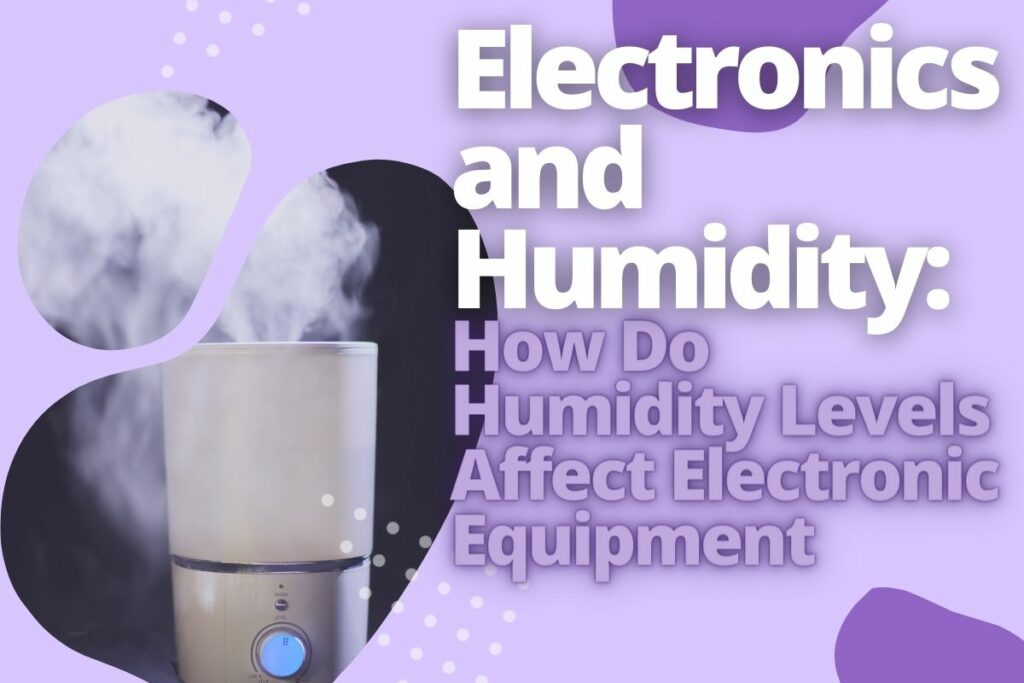
In short, humidity can damage or even destroy electronic equipment if it’s not maintained correctly. Humidity can damage electronic equipment in a few different ways:
- By damaging electronic components through rusting or corrosion
- By reducing the lifespan of electronic components
- By causing electronic equipment to malfunction
- By causing electronic equipment to overheat
To avoid these issues, maintain a comfortable room temperature and moderate humidity levels. This will help keep electronic equipment in good working condition and prevent damage or destruction.
Dangers of Humidity
It is essential to keep humidity levels low to protect electronic equipment from moisture and corrosion. This moisture can then leak into electronics and damage them over time.
To avoid this, keep humidity levels low by using air conditioning or dehumidifiers when necessary. In addition, keep electronic equipment adequately sealed and free of dust, dirt, and moisture.
You may extend the life of your electronic devices by following these simple guidelines!
Effects of Humidity On Electronics
To protect electrical devices, it is vital to be aware of the impacts of humidity. Electronics are sensitive to moisture and can be damaged if not kept in a dry environment.
Keeping your electronics in a cool, dry place will help minimize the effect of humidity on them. In addition, make sure you clean your electronic equipment regularly to remove any moisture build-up.
Additionally, make sure that you don’t leave electronic devices charging in humid areas; instead, put them in an air-conditioned area or use a Power Strip with a humidifier function.
Effects Of High Humidity On Electronic Devices
Electronic equipment can be damaged by high humidity levels, short-circuit parts and ruin the device. Computers and smartphones are particularly vulnerable to dampness when it comes to computers and smartphones.
If your home is constantly filled with moisture, you should open all windows to allow in the fresh air. In addition, keep electronic equipment in a dry place – preferably in a cool or dry place – and avoid storing it near humidifiers.
Can You Use A Humidifier With Electronics Nearby?
Many people are unaware that humidifiers can be used near electronic equipment. In some cases, the moisture can help to protect the electronic equipment from damage.
Additionally, humidifiers are one of the best ways to avoid static electricity in the air during cold weather seasons like fall and winter. Unfortunately, many people mistakenly think that it cannot be used near electronics because the humidity will damage them. When in doubt, check with your manufacturer or consult an expert before using humidifying unit near your electronics.
Can you use a humidifier with electronics in the bedroom?
Humidifiers are designed to add moisture to the air, which helps reduce the risk of damage from overheating electronics. They can also be a great way to keep your room at a comfortable humidity level, especially during dry periods.
However, allow the humidifier time to work before turning on your electronics. And remember to put the humidifying unit in a place where it will not come into contact with any delicate electronic components.
If you’re worried about your electronics getting damaged by condensation from a humidifier, you can put them on a different floor or in a separate room. Condensation could lead to a short circuit or static discharge.
You can use it with electronics in the bedroom, but be aware that it can cause physical damage to metallic parts, and air moisture can ruin electronic components.
How Do Humidifiers Affect Electronics?
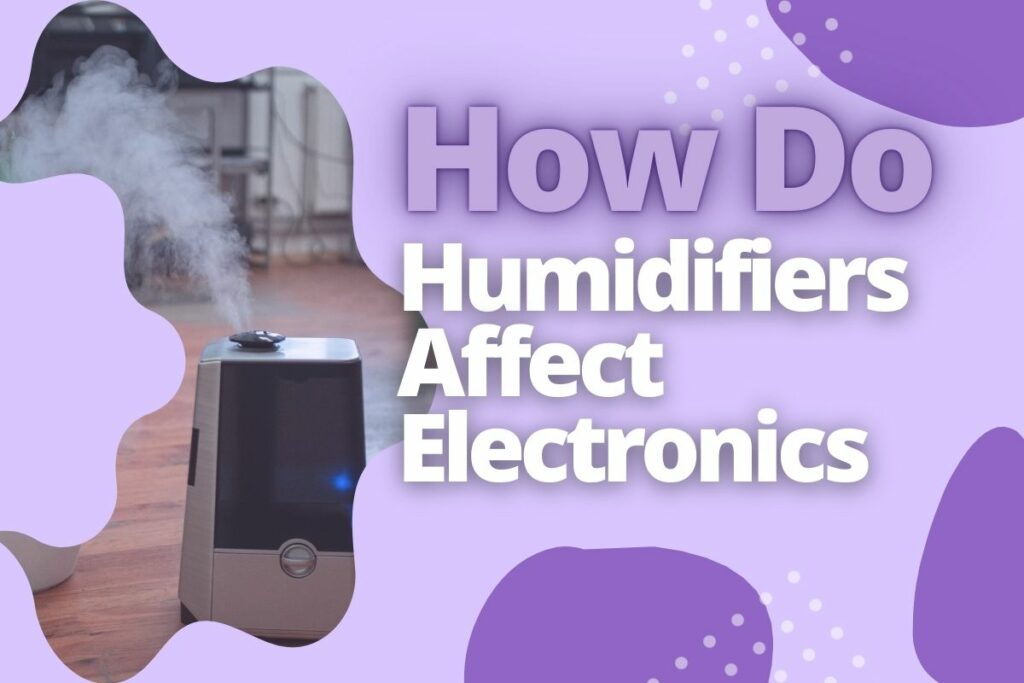
Humidifiers can affect electronics in several ways. The most common way is through the electrical components. Humidity levels can cause electrical components to become damaged.
This can cause the electrical components to short circuit. The shorting of the electrical components can cause the electronic product to stop working.
It can affect electronics through the heating of the appliance. The device can overheat if the humidity level is too high. This can lead to the appliance’s components breaking down.
The heat from the appliance can also damage the circuit boards. In addition, the humidifying unit can affect electronics through the rusting of the internal components.
Rust can form on internal components if the humidity is too high. The rusting of the internal components can damage the electronic product.
Do Humidifiers Damage Electronics?
The answer, fortunately, is no — at least, not under most circumstances.
There are, however, a few conditions under which a humidifier could potentially damage electronics. One is if it is placed too close to the electronic device.
The water vapor from the unit can condense on the device, and if this happens repeatedly, it can cause damage.
Another potential problem occurs when there are sudden changes in humidity. If the humidity level drops suddenly, the water vapor in the air can condense on electronic devices and cause damage.
Finally, if there is a lot of dust in the air, it can collect on the electronic device and cause a short circuit.
So, while humidifiers generally don’t damage electronics, there are a few conditions that could potentially cause problems.
Do Different Types Of Humidifiers Affect Electronics?
When using humidifiers, be sure to keep them away from water and other liquids! Humidifiers can help protect electronic devices from damage by the environment, and they also help increase their lifespan.
Different humidifiers can have different effects on electronics and their life span. For example, indoor humidity can cause electrical discharges that can damage electronics.
Similarly, changes in humidity can cause moisture to build up on electronic components, which can lead to corrosion and shorten their life span.
Does Mist Affect?
When it comes to moisture, most electronics don’t mix well. That’s because moisture can cause problems, from corrosion to shorts. Even a little bit of moisture can have a significant impact on electronics.
Water is made up of tiny particles called molecules. When water molecules come into contact with an electrical current, they can interfere with the electricity’s path.
This can cause the current to take a different path, damaging the electronic product.
In addition, water molecules can also change the resistance of the electrical current. When the resistance is changed, it can cause the current to become too strong, damaging the electronic product.
The Relationship Between Electronics and Humidifiers
When the air inside your home is too dry, it can cause several problems. First, dry air can cause static electricity, which can damage electronics.
An air humidifier adds moisture to a room. This increased moisture content can help reduce static electricity and make your skin and hair less dry. In addition, humidifiers can help reduce the spread of viruses and bacteria.
The best way to find the right humidity level for your home is to use a hygrometer. This gadget monitors moisture content in the air. You can then adjust the humidifier to maintain a comfortable level of humidity.
Can You Rely On Electronics Safety Around Humidifiers?
Electronic devices and humidifiers can be a dangerous combination. Many people use electronic gadgets without realizing it, which can lead to dangerous situations if the humidifier is nearby.
It’s not the humidifier itself that you need to worry about. Instead, the humidity that the humidifier creates can potentially damage your electronics.
When the air is more humid, it has less resistance. This means that electrical current can flow more freely through the air. As a result, electronic gadgets can overheat and break if there is a lot of electricity running through them.
This is, of course, merely a potential issue. If you’re using a humidifier in a well-ventilated room and don’t have any electronics that are prone to overheating, you probably don’t have anything to worry about.
Using a Humidifier with Electronics: The Pros and Cons
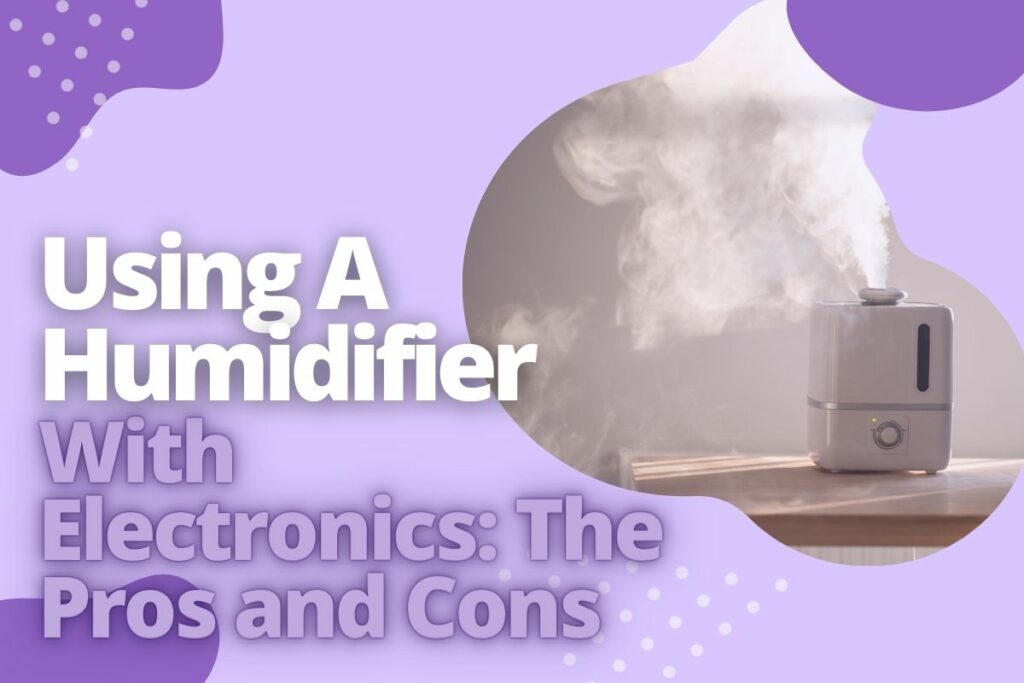
Using a humidifier with electronics can have both positive and negative effects. On the positive side, humidifiers can help prevent electronic components from drying out and becoming damaged.
They can also help keep dust and other particles from settling on electronic components and causing problems.
On the negative side, humidifiers can cause condensation to build up on electronic components, leading to corrosion and other problems.
How to Safely Use a Humidifier with Electronics
While humidifiers can be beneficial in regulating the humidity levels in your home, they can also cause water droplets to form on surfaces, leading to damage if not properly managed.
One of the most common ways humidifiers can damage electronics is by causing the console or device to overheat.
When the humidity in the room changes, the electric current running through the electronic device can be affected, this can cause the device to malfunction or even stop working altogether.
Another risk of using a humidifier with electronics is the potential for excess moisture to damage the electronic product.
Corrosion can occur when water droplets develop on an electrical device’s surface and penetrate the device’s cracks. This can lead to short-circuiting and potentially permanent damage to the device.
It is important to take proper precautions when using a humidifier with electronics to avoid these risks. Ensure to keep the humidifier away from any electronic devices, and do not allow the humidifier to run for extended periods without supervision.
In addition, be sure to empty the humidifier regularly to prevent the build-up of water droplets. Taking these precautions can go a long way toward protecting your electronic devices.
How to Protect Electronics from Humidity
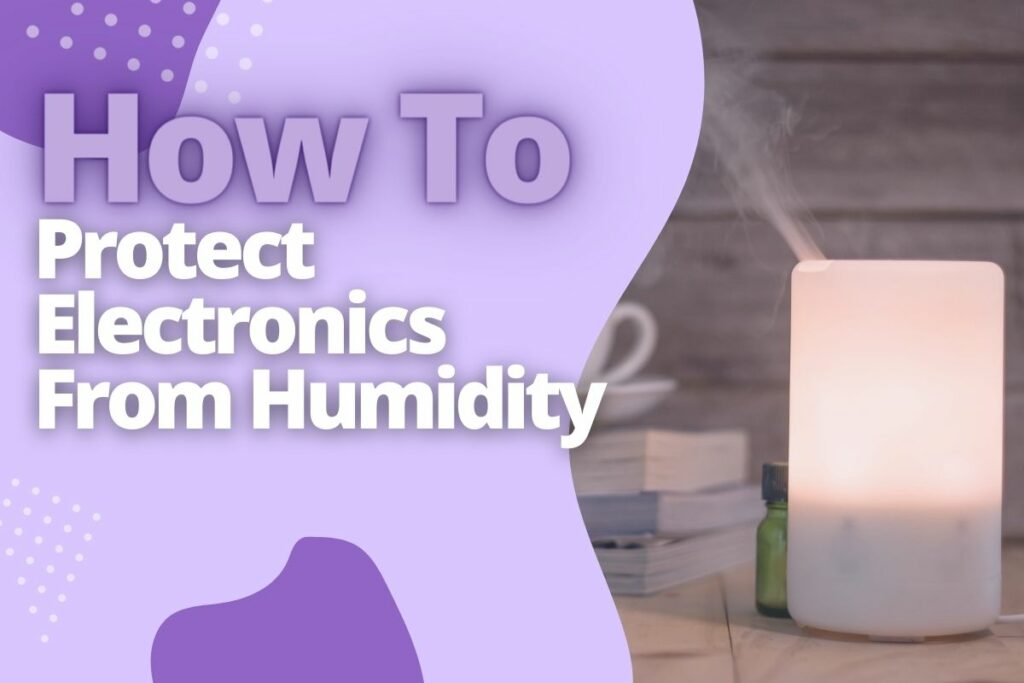
When it comes to humidity and electronics, it is important to protect your devices. Whether it is your computer, television, or other electronic equipment, exposure to too much moisture can cause damage.
- One way to protect electronics from humidity is to cover them up when they are not in use.
- A cover can be made of cloth or other materials to keep the moisture from reaching the device.
- Another way to protect electronics is to keep them in a cool, dry place.
Tips for Using a Humidifier with Electronics
Electronic devices can suffer in dry air, so adding moisture is essential. In addition, a humidifier can help to prevent your electronics from deteriorating over time.
If you’re going to use a humidifier with your electronics, there are a few things you need to know. Here are some tips:
- Make sure the humidifier is clean. Any dirt or bacteria in the water can damage your electronics.
- Don’t put the humidifier too close to your electronics. The water vapor can damage them.
- Don’t use a humidifier with electronics that are not designed to be used with one.
- Using a hygrometer, check your home’s humidity level doesn’t get out of control.
- Use a humidifier with a timer, so it doesn’t run all the time.
- Don’t use a humidifier with electronic devices with open ports or exposed circuitry.
Symptoms that Indicate Low Humidity in an Electronics Area
Humidity is essential for electronic equipment and gadgets to work optimally. If humidity levels are low, electronic devices can experience several problems, from data loss to decreased performance.
Static electricity can accumulate on surfaces due to low humidity. This can damage sensitive electronic components or cause data corruption.
Low humidity can also cause metals to corrode. Electrostatic charge can build up on surfaces when the air is dry.
This can lead to dust and other particles that can damage delicate electronic equipment.
How To Protect Electronics From Humidity
Electronics are vulnerable to humidity, which can damage their electronic components. To protect them, you can use various methods, including electronic sealant.
If you plan on keeping your device wrapped in plastic wrap or foil, use a screen protector to keep the device safe from scratches and damage.
Keep your device in a dry environment and away from direct sunlight and heat sources. Finally, keep your device’s electronic components protected by using a humidifier or sealant when needed.
Can You Use a Humidifier Without Adding Too Much Humidity?
Yes, you can use a humidifier without adding too much humidity. The optimum humidity level can be maintained in your home as long as you watch it.
- The recommended range is typically between 30% and 50%.
- Your home may become a breeding ground for mold and dust mites if the humidity rises too high.
- Too much humidity can also cause respiratory problems.
Can You Put Humidifier Next To Computers At Home Or Office?
Most people know that computers generate a lot of heat. In reality, preventing overheating is a primary goal of computer fans, which are incorporated into most modern models.
All this heat can dry out the air around your computer, which can, in turn, damage your computer. The humidity produced by a humidifier can help offset the drying effect of the heat generated by your computer.
A humidifier close to your computer has a few considerations to keep in mind. First, consider how big the room is before purchasing a humidifier. Make sure the humidifier is set to the correct humidity level.
Too much humidity can damage your computer just as much as too little humidity. Finally, make sure the humidifier is placed so that the air from the humidifier does not directly blow onto your computer.
Conclusion
This site has covered every aspect of humidifiers and electronics for you.
By understanding the relationship between humidity and electronic equipment, you can ensure that your electronic equipment is safe and functioning optimally.
Additionally, you can safely use a humidifier with electronics by following the tips given. Ensure to read through all the tips before taking any action, as improper humidification can damage electronic equipment.
Finally, we have answered some common questions about humidifiers and electronics. For more information on this topic, check out our website. Thanks for reading!
Frequently Asked Questions
What can you do if your electronics are affected by humidity?
When electronics are affected by high humidity, it can cause a condition called condensate. Condensate is the formation of small water droplets on the surface of something. When this happens to electronics, it can cause damage to the device or its internal components. To minimize the risk of moisture damage, follow these tips: -Avoid storing electronic equipment in humid areas -Keep electronic equipment in a dry place -Wipe down electronic equipment with a dry cloth.
How can you measure humidity levels around your electronics?
A digital hygrometer will give you an accurate reading of the humidity in your home. If you’re concerned about your electronics, look for a model that offers a low range of at least 30-60% and an accuracy of at least +/- 1%.
How can you tell if a humidifier is affecting your electronics?
One way to determine if an electronic device is being affected by humidity is to remove the device near the humidifier and observe it. If moisture has condensed on the device’s surface, moisture may affect the device. The condensed moisture itself is what’s damaging to electronics. Condensed moisture can leave behind residue and even corrosion.
What to do to prevent humidity from affecting electronics?
To prevent humidity from affecting electronics, keep them in a dry area. The best way to prevent humidity from affecting your electronics is to buy an air conditioner. An AC will maintain a consistent temperature and keep the relative humidity inside at bay.
Author
- Does A Humidifier Heat Water Into Vapor (You’ll Be Surprised)
- Is Using A Humidifier Good For Eczema? – Find Out Here
- Keep Safe: Can Humidifiers Cause Fires?
- Humidity Control: Fan Or Humidifier? (Solve The Dilemma)
- Is A Diffuser Also A Humidifier (Discover The Difference)
- Can A Diffuser Be A Humidifier (Discover Now)


